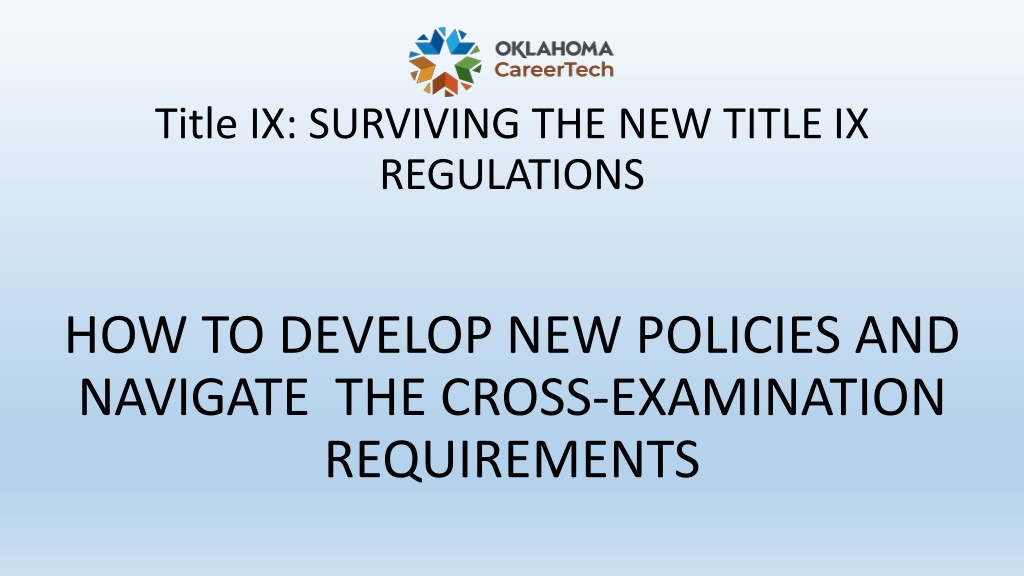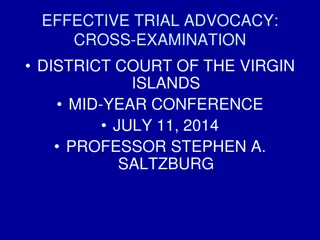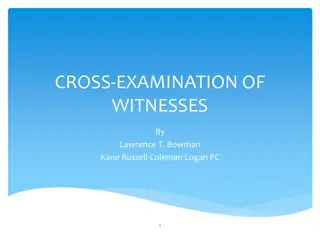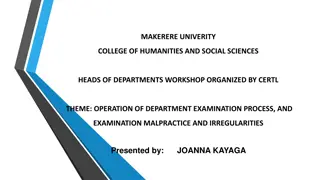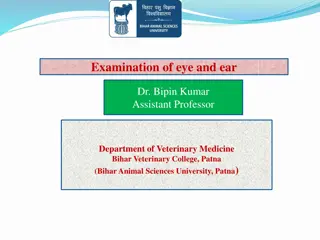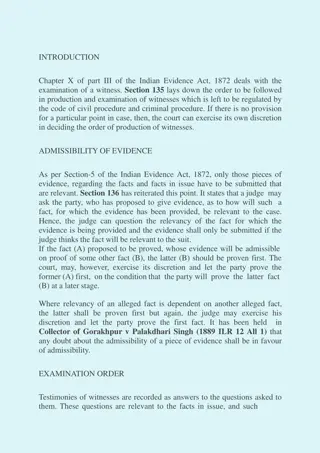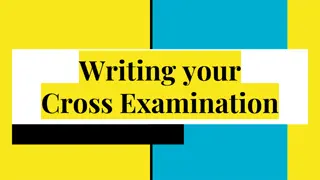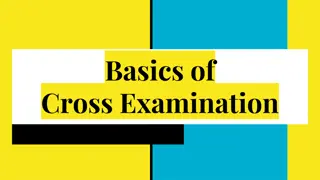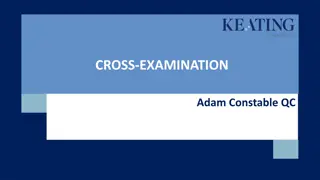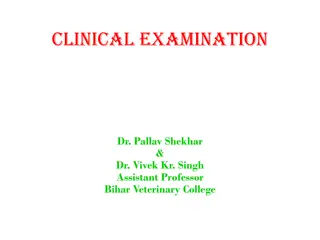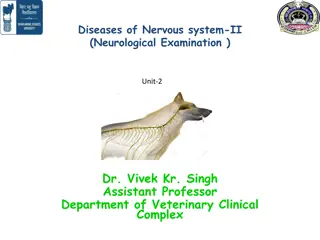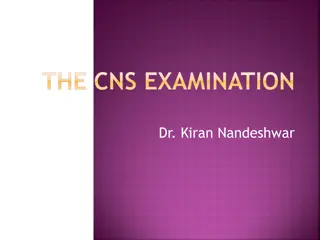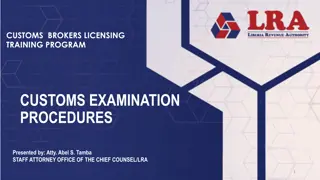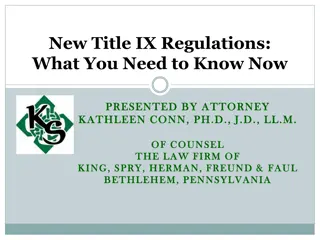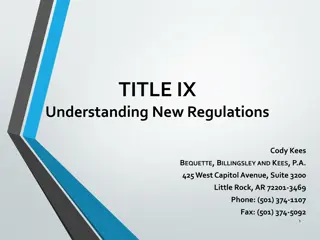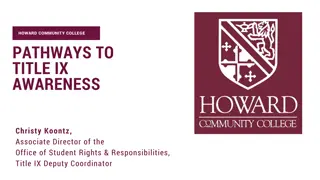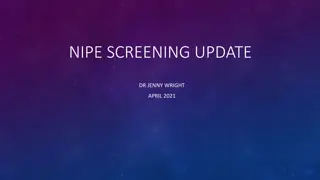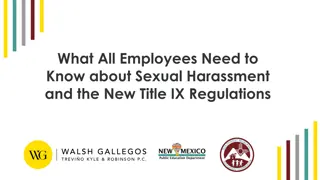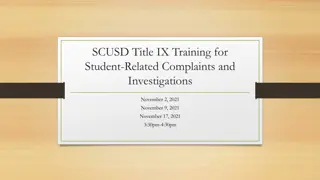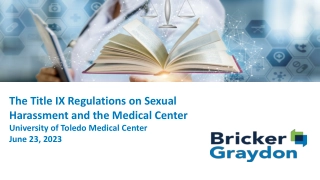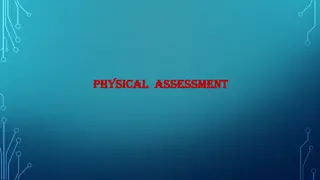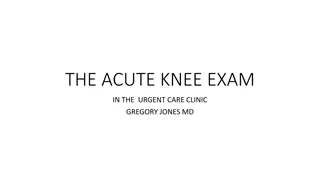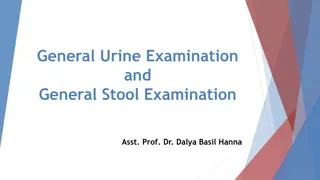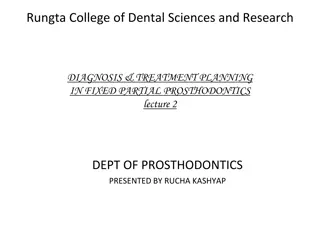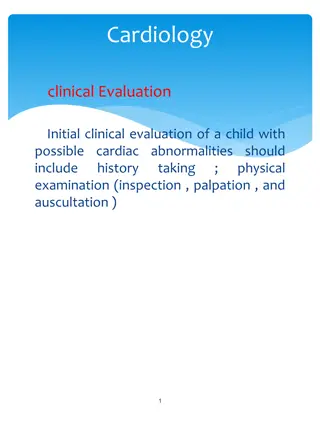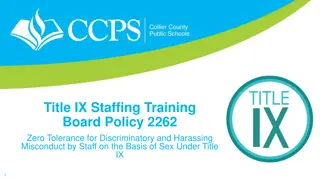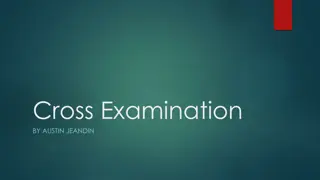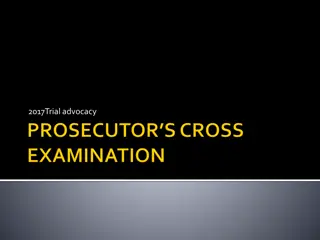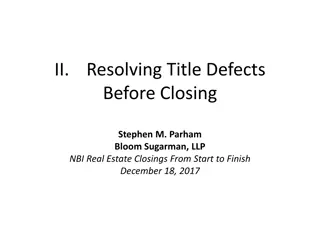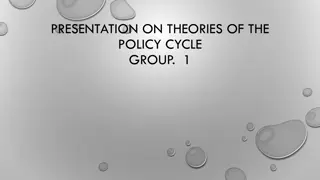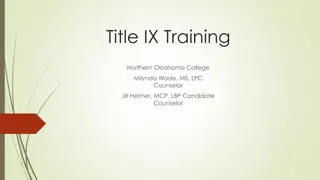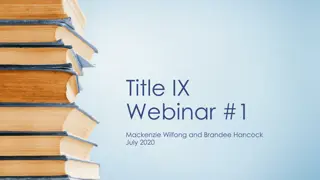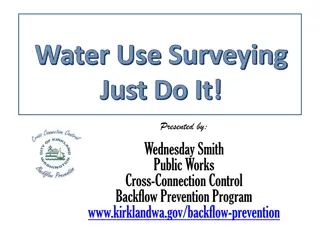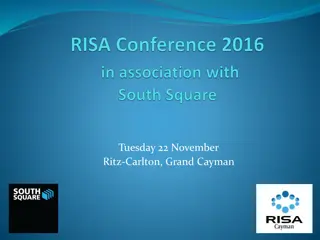Navigating New Title IX Regulations: Policy Development & Cross-Examination
Learn how to develop policies and address challenges posed by the new Title IX regulations, including live hearings, cross-examination, evidentiary standards, and off-campus jurisdiction. Understand the new regulatory definitions and the importance of complying with the evidentiary and jurisdiction standards set forth by the Department of Education.
Download Presentation

Please find below an Image/Link to download the presentation.
The content on the website is provided AS IS for your information and personal use only. It may not be sold, licensed, or shared on other websites without obtaining consent from the author. Download presentation by click this link. If you encounter any issues during the download, it is possible that the publisher has removed the file from their server.
E N D
Presentation Transcript
Title IX: SURVIVING THE NEW TITLE IX REGULATIONS HOW TO DEVELOP NEW POLICIES AND NAVIGATE THE CROSS-EXAMINATION REQUIREMENTS
Department of Education Releases New Title IX Regulations Title IX of the Education Amendments Act of 1972 No person in the United States shall, on the basis of sex, be excluded from participation in, be denied the benefits of, or be subjected to discrimination under any education program or activity receiving Federal financial assistance.
New Challenges Posed by New Regulations: Some Big Ones 1. Live Hearings 2. Cross Examination 3. Role ofAdvisors 4. Evidentiary Standards 5. Off-Campus Jurisdiction
Definition of Sexual Harassment New Regulatory Definition Existing federal and state case law regarding sexual harassment and quid pro quo sexual harassment or Unwelcome conduct on the basis of sex that is so severe, pervasive, and objectively offensive that it denies a person access to the school s education program or activity.
New Regulations Evidentiary Standard Previous Standard New Standard Institutions may choose between the two (PoE or C&C) Schools must apply the same standard of evidence to all formal complaints of sexual harassment, ie: against employees (including faculty) Mandated that institutions use preponderance of the evidence Lower standard than clear and convincing evidence
Off-Campus Jurisdiction New Prior Includes off-campus if within a school s education program or activity Included off-campus Included during study abroad Excludes study abroad
Live Hearing Requirement Regulations provide: Under 106.45(b), Postsecondary schools must provide for live hearing during the grievance process Most challenging feature of the live hearing requirement is the cross-examination requirement
Hearings for Elementary and Secondary Schools Elementary and secondary schools are free to conduct grievance proceedings without any type of hearing, including a live hearing. They may choose to but are not required to provide live cross- examination or the other hearing procedures outlined in the Title IX. With or without a hearing, after the schools sends the investigation report to the parties and before reaching a determination regarding responsibility, the decision-makers must afford each party the opportunity to submit written, relevant questions that a party wants asked of any party or witness, provide each party with the answers, and allow for additional, limited follow-up questions from each party.
Role of Advisors Advisor Requirement All parties are entitled to an advisor of their choosing School must provide an advisor if party wants an advisor but does not have one Advisor can be anyone, including an attorney
Cross-Examination Now Parties must be provided advisors who can, but are not required to be, attorneys Must allow for pause before witness/party gives answers Can be done remotely / separate rooms via technology Only relevant questions allowed Parties can refuse to submit to cross-examination Previously No cross-examination required
What is Cross-Examination? According to Merriam-Webster: The examination of a witness who has already testified in order to check or discredit the witness's testimony, knowledge, or credibility.
What is Cross-Examination? According to John Wigmore: Cross Examination is beyond any doubt the greatest legal engine ever invented for the discovery of truth.
Just Ask Any Witness Who is About to be Cross Examined
Purpose for Cross-Examination Probe witnesses on: Credibility/trustworthiness Memory and ability to remember facts of case Background Bias/conflicts of witness
Cross-Examination & Credibility Determining Credibility Conflicts, Discrepancies/ Inconsistencies Opportunity to Observe Demeanor Some limitations Motive/Bias Cross Inherent plausibility Internally consistency
New Regulations on Cross-Examination Live Hearing Advisors must be allowed to cross-examine other parties and witnesses in live hearing Such cross-examination at the live hearing must be conducted directly, orally, and in real time by the party s advisor of choice and never by a party personally No party can ever be allowed to personally question or cross-examine anyone, only through advisors If any party requests, entire hearing must be held with parties located in separate rooms, using technology to see/hear all
Title IX Guidance on Implementing Cross Examination What specific guidance do the new regulations give for implementing the new cross examination procedures?
New Regulations on Cross-Examination Advisors School cannot limit party s choice of advisor No advisor? No problem! If a party does not have an advisor at the live hearing, recipient must provide advisor to perform cross May be, but is not required to be, an attorney
In-House Advisors Pros and cons Pros: Lower costs, people familiar with campus environment Cons: Potential conflicts & may have to go up against lawyers
Lawyers as Advisors Pros and Cons Pros: Experience and skill at cross-examination Cons: Management, no judge, no rules of evidence
Managing Cross-Examination Limitations on Cross-Examination Relevance is only evidentiary exclusion imposed by the regulations Questioning must be respectful (per student codes)
How To Determine Relevance Rule 401 of the Federal Rules of Evidence Test for Relevant Evidence: Evidence is relevant if: a) It has any tendency to make a fact more or less probable than it would be without the evidence; and b) The fact is of consequence in determining the action.
When Must Relevance be Determined? Real-time The decision maker must exclude irrelevant questions Makes relevance determination on the spot before party/witness answers Regulation language: Before a complainant, respondent, or witness answers a cross- examination or other question, the decision- maker(s) must first determine whether the question is relevant and explain any decision to exclude a question as not relevant.
The Pause What is the pause ? Break in the flow of the hearing, during which decision maker determines relevance of question Happens after every question
New Regulations on Cross-Examination Relevance Relevance explanation does not have to be lengthy Provides a pause in process; pace does not place undue pressure for immediate answer Appeal of erroneous relevance determinations permitted DOE declined to revise regulations to require submission of questions prior to hearing
Limitations on Cross-Examination Prior Sexual History Prior sexual history is only allowed in two narrow circumstances: 1. Someone other than the Respondent committed the sexual harassment 2. The sexual behavior between the Complainant and the Respondent is offered to prove consent
Tips on How to Manage Cross- Examination Encourage/require advisors to submit questions with the format of a tree of all possible questions If yes, then I will ask this follow-up question If no, then I will ask this Encourage/require advisors to submit the kinds of evidence that they would use to test credibility on cross
Tips on How to Manage Cross- Examination DOE recognizes schools can set forth rules of decorum to ensure respectful questioning School can require party to use a different advisor if advisor refuses to adhere to rules, i.e., even if question is relevant but manner of asking is abusive, school can enforce rules
Adjudication & Hearing Management Training Who Needs to be Trained Advisors School-provided advisors Flexibility to provide trauma-informed training Panels Decision Makers Relevancy, weighing evidence Title IX Office
Solution Models Develop 100% in-house advisors and panel/decision makers Outsource advisors Outsource hearing/decision-maker roles Outsource hearing management services
100% In-House Training for staff, faculty, and students Develop pool of potential advisors and panel members
Outsource Advisors Develop pool of available attorneys Retain law firm to serve as advisors Caution: Beware of conflicts of interest
Outsource Hearing A La Carte Approach: Retired judge, professional mediator Law firm with arbitration experience
Hearing Management Services Develop hybrids of above models tailored to institutional needs and resources Vet and develop local networks of decision makers and advisors Provide advisor services for hearings Supplement in-house general counsel or function as limited outside general counsel
Title IX: SURVIVING THE NEW TITLE IX REGULATIONS Contact Info: Alan Nahs Civil Rights Coordinator alan.nahs@Careertech.ok.gov Office: 405-743-5578 Cell: 405-880-9457
